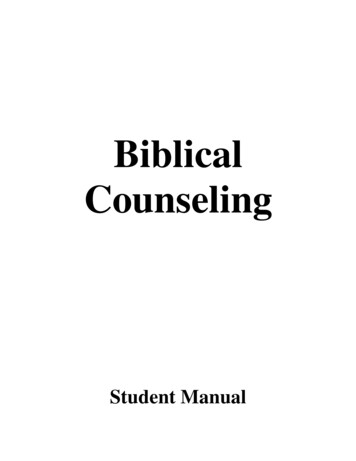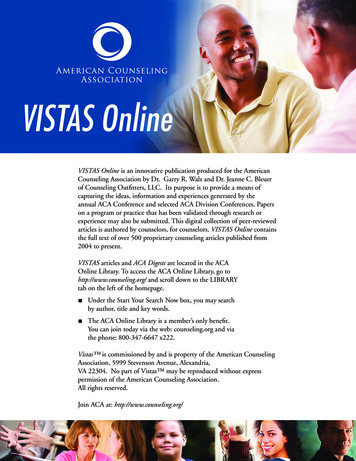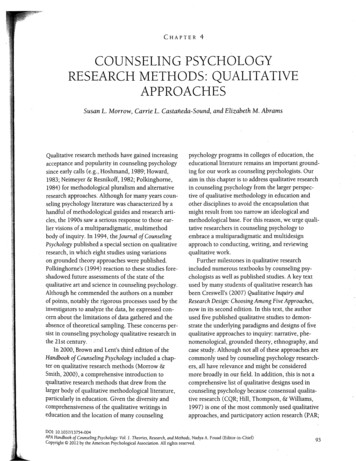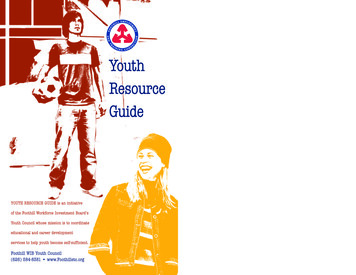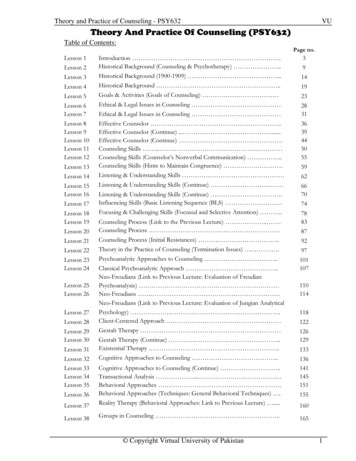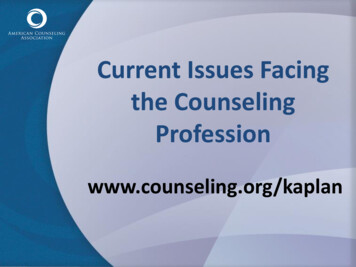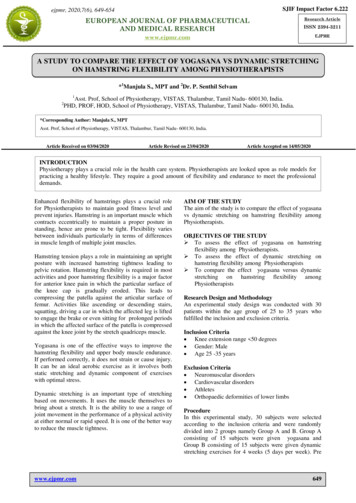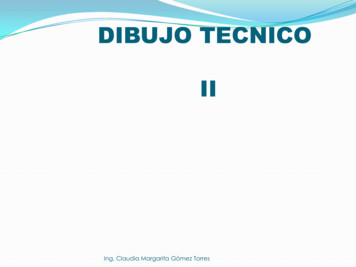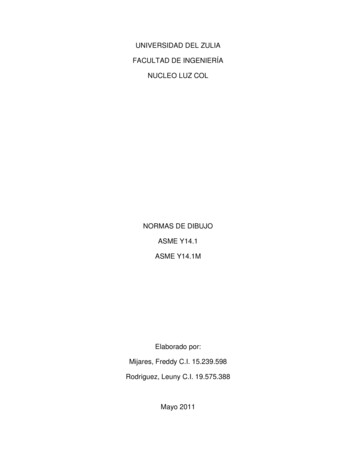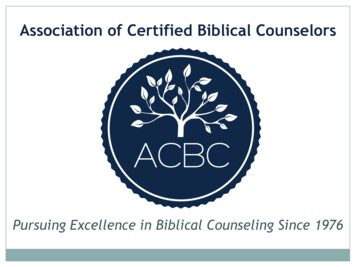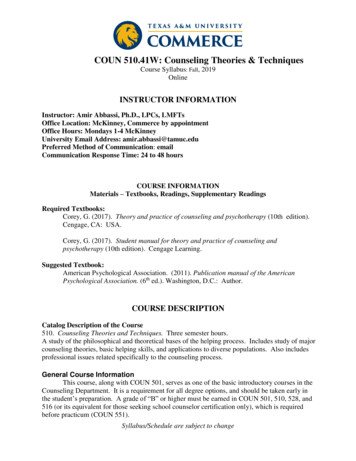
Transcription
VISTAS OnlineVISTAS Online is an innovative publication produced for the AmericanCounseling Association by Dr. Garry R. Walz and Dr. Jeanne C. Bleuerof Counseling Outfitters, LLC. Its purpose is to provide a means ofcapturing the ideas, information and experiences generated by theannual ACA Conference and selected ACA Division Conferences. Paperson a program or practice that has been validated through research orexperience may also be submitted. This digital collection of peer-reviewedarticles is authored by counselors, for counselors. VISTAS Online containsthe full text of over 500 proprietary counseling articles published from2004 to present.VISTAS articles and ACA Digests are located in the ACAOnline Library. To access the ACA Online Library, go tohttp://www.counseling.org/ and scroll down to the LIBRARYtab on the left of the homepage.nUnder the Start Your Search Now box, you may searchby author, title and key words.nThe ACA Online Library is a member’s only benefit.You can join today via the web: counseling.org and viathe phone: 800-347-6647 x222.Vistas is commissioned by and is property of the American CounselingAssociation, 5999 Stevenson Avenue, Alexandria,VA 22304. No part of Vistas may be reproduced without expresspermission of the American Counseling Association.All rights reserved.Join ACA at: http://www.counseling.org/
Article 12A Qualitative Analysis of Adult Learners’ ImmersionExperiences to South Africa:Implications for Multicultural TrainingMichele RibeiroIntroductionTravel broadens the mind and expands the self. Imagine apilgrimage to the source of the holiest river in India, the Ganges.The trek involves three days to reach the enormous melting glacierthat forms the vast river. Indian and foreign pilgrims that reach thesource of the Ganges take the icy plunge into the river to purifythemselves, as is indoctrinated by religious belief. This plungesomehow changes them. Similarly, Killian and Hardy (1998) coinedthe term cultural plunge as dips into a new cultural experience. Intheir article, the plunge is used as a metaphor describing theexperiential component of professional training as a therapist. Theexperience provides individuals the opportunity to possess minoritystatus and experience the anxiety or discomfort often associated withbeing an “outsider.” What about the cultural experience causes changefor each individual?Gmelch (1997) and Miranda (1999) found undergraduatestudents returning from their study-abroad trips feeling moreadaptable, less materialistic, independent in their thinking, sensitiveto other cultures, and knowledgeable. The abundant literature onundergraduate study-abroad experience and experiential learning inmulticultural education shows a positive effect for enhanced culturalunderstanding through study abroad experiences (Laubscher, 1994;121
Stitsworth, 1989; Talburt & Stewart, 1999). Limited research exists,however, in recognizing the unique needs of adult learners, who maynot have experienced study abroad or who were not exposed tomulticultural courses, but are still required to exhibit the necessaryskills to work with culturally diverse populations. Teachers and mentalhealth workers in particular need the necessary training to understanddifferent cultures, because these professions require the professionalto empower and work within the student’s/client’s framework.Study Tours as Multicultural Training ToolsOne method that is currently being used to meet the unique needsof professionals/practitioners is study tours. Study tours have emergedas a viable way to combine education and culture within a 2- to 3week period of time. Adult learners, who have work, family, andother commitments, may not have the extended time to take off from5 weeks to a semester, as study abroad programs require. Thus, abrief study tour that incorporates an educational component andparallels the adult’s professional work provides another vehiclethrough which to teach the necessary skills and knowledge needed towork within a multicultural society. Despite the potential of studytours, there is little empirical wisdom to inform the conceptualizationand delivery of these tours so that adult learners gain the relevantcultural understanding needed. This study explores and describesthrough a qualitative lens the experiences of adult learners during abrief educational study tour to South Africa.Experiential and Immersion Experiences in TrainingRidley, Mendoza, and Kanitz (1994) defined the concept ofexperiential training as “exercises that provide occasions for traineesto personally experience immersion in a culture different from theirown” (p. 263). Sue and Sue (1990) suggested that courses shouldcontain affective and reflective components that go beyond the typicalacquisition seen in most training programs. Often assignments thatincorporate experiential components provide more opportunity for122
the arousal of emotions that are helpful in the critical reflection ofindividual and societal assumptions and beliefs. It was suggested thatin-class exercises are “a step in the right direction” but the interactionwith different cultures provides a still greater opportunity formulticultural learning (Pope-Davis & Coleman, 1997). As a reaction,the Multicultural Immersion Experience (MIE) was developed byPope-Davis, Breaux, and Liu (1997). The MIE is an assigned courseactivity that requires students to immerse in a campus or communitygroup culturally different from their own. The benefits of this type ofimmersion allow for a deeper level of reflection and a greateropportunity to understand the differences and similarities of othergroups.Experiential and Transformative Learning TheoriesExperiential learning can be understood as learning “in whichthe learner is directly in touch with the realities being studied” (Keeton& Tate, 1978). Kolb (1984), based on the works of Dewey, Lewin,and Piaget, identified an experiential learning theory to betterunderstand the process of learning through experience. The fourcomponents of his theory include an affective component, a perceptualcomponent, a symbolic component, and a behavioral component. Eachcomponent is caused by a particular experience and results in higherorder processes (Kolb, 1984).Transformative learning is defined as “the social process ofconstruing and appropriating a new or revised interpretation ofmeaning of one’s experience as a guide to action” (Mezirow, 1994,pp. 222–223). Mezirow identified designs of research that include“observations and content analysis in an ongoing educational context”as valuable ways to assess the learning process (p. 34). Providingdifferent perspectives from qualitative research sheds more light onthe process and outcomes of experiential learning and if and whenlearning can be transformative.123
MethodCulture is multidimensional. It is integrated into all aspects ofsociety and both shapes and is shaped by the individuals and groupsin which it is a part. It is a concept that is complex, dynamic, anddefined in different ways. The definition of culture guiding this studyrefers to “an integrated pattern of human behavior that includesthoughts, communications, actions, beliefs, values and institutionsof a racial, ethnic, religious, or social group” (Cross, Bazron, Dennis,& Issacs, 1989, p. iv.) Through the use of life story interviews, journalanalysis, photograph analysis, observation/field notes, and criticalreflective post tour interviews, this study explores the specific culturaldynamics of gender, ethnicity, and the socioeconomic differences andsimilarities of U.S. educators as they experience the educationalsystem and a society that conforms to both similar and different beliefsand values.ResultsKnowledge components of South Africa were enhanced due tothe study tour. One 34-year-old, White female teacher stated, “Ilearned what the teachers are dealing with as compared to the U.S.”She identified similarities with administration problems but a vastdifference in the amount of resources the schools she visited had ascompared to the U.S. Additionally, the awareness component washeightened for a 28-year-old Hispanic college administrator. Shealluded to “feeling uncomfortable, nervous, wanting to make a goodimpression” when a South African graduate student took her to hishome and she played with his child.Critical Reflection: A Key ComponentThe 28-year-old Hispanic administrator expressed that race and,to some extent, gender were most salient during the tour for her. Sheindicated that the amplification of race happened in part because ofthe tour. “It was really weird. There were African Americans and124
there were white people on this trip. And for the most part we brokedown into lines or groups by race, which surprised me because Ithought we were all beyond that. But I felt very white.” When askedwhether she brought it up to the group, she expressed “Uh, no, well,no. We didn’t talk about that, and that’s one of the things that wouldhave been nice to have some critical reflection for.” Another tourparticipant, a 23-year-old female Egyptian teacher, also noted in herinterview a similar observation of the split between White and Blacktour participants and the failure to discuss the issue during the tour.Group LearningWhen learning about other cultures in a group or class format,group learning also plays a role in what adult learners reflect uponand potentially try out in future episodes in their life. One participantcommented, “I was just amazed by T, cause she could just walk up topeople on the street (in South Africa) and just start talking to them.One day we came back to the hotel and she was having a littlerendezvous in the dining room, talking about how to get books froman organization she was a part of to build a library (in South Africa).Um, it gave you something to be inspired by and aspire to.”SummaryStudy abroad trips have shown a positive effect for enhancingcultural understanding, yet are mostly geared toward undergraduatestudents due to the time required to participate in them. An educationalstudy tour, in comparison, is a 2- to 3-week educational immersionexperience offered to expose adults to learning within a differentcultural context. Study tours were identified as potential, additionaltraining tools, expanding on the Multicultural Immersion Experienceproposed by Pope-Davis, Breaux et al.(1997). Using experiential andtransformative learning theories as a guide, a qualitative study wasconducted that incorporated recorded observations/field notes duringthe tour, pre- and post tour interviews, journal analyses, and photoanalyses into the data collection and analysis portion of the study.125
Individual interviews presented the enhancement of knowledge andawareness of adult learners who participated on a 2-week tour toSouth Africa.ConclusionThis study supports the idea that adult learners not only canbenefit from cultural immersion experiences, but that also it can be avaluable learning tool in multicultural training and education. Criticalreflection that happens at various points throughout the tour canenhance experiential learning and increase the potential for the culturallearning to be tranformative. If critical reflection is not fostered,however, valuable learning can be lost or faulty stereotypes/biasesmaintained.ReferencesCross, T. L., Bazron, B. J., Dennis, K. W., & Isaccs, M. R. (1989).Toward a culturally competent system of care. Washington, DC:Child and Adolescent Service System Program TechnicalAssistance Center.Gmelch, G. (1997). Crossing cultures: Student travel and personaldevelopment. International Journal of Intercultural Relations,21(4), 475–490.Keeton, M.T., & Tate, P. J. (1978). Editors note:The boom inexperiential learning (pp. 1–8). In M. T. Keeton & P. J. Tate(Eds.), Learning by experience—What, why, how. New directionsfor experiential learning. San Francisco: Jossey-Bass.Killian, K. D., & Hardy, K. V. (1998). Commitment to minorityinclusion: A study of AAMFT conference program content andmembers’ perceptions. Journal of Marital and Family Therapy,24, 207–223.126
Kolb, D. A. (1984). Experiential learning: Experience as the sourceof learning and development. Engelwood Cliffs, NJ: PrenticeHall.Laubscher, M. R. (1994). Encounters with difference: Studentperceptions of the role of out of class experiences in educationabroad. Westport, CT: Greenwood Press.Mezirow, J. (1994). Response to Mark Tennant and Michael Newman.Adult Education Quarterly, 44, 222–232.Miranda, E. L. (1999). Multiple cultural experiences: An explorationof their effects and the fostering of creativity. (Doctoraldissertation, Texas A&M University, 1999).Pope-Davis, D. B., Breaux, C., & Liu, W. M. (1997). A multiculturalimmersion experience: Filling a void in multicultural training.In D. B. Pope-Davis and H. L. K.Coleman (Eds.), Multiculturalcounseling competencies: Assessment, education and training,and supervision (pp. 227–241). Thousand Oaks, CA: Sage.Pope-Davis, D. B., & Coleman, H. L. K. (Eds.). (1997). Multiculturalcounseling competencies: Assessment, education and training,and supervision. Thousand Oaks, CA: Sage.Ridley, C. R., Mendoza, D.W., & Kanitz, B. E. (1994). Multiculturaltraining: Reexamination, operationalization, and integration. TheCounseling Psychologist, 22, 227–289.Stitsworth, M. H. (1989). Personality changes associated with asojourn in Japan. Journal of Social Psychology, 129, 213–224.Sue, D. W., & Sue, D. (1990). Counseling the culturally different:Theory and practice. New York:Wiley.127
Talburt, S., & Steward, M. A. (1999). What’s the subject of studyabroad?: Race, gender, and “living culture.” Modern LanguageJournal, 83(2), 163–175.128
tab on the left of the homepage. n Under the Start Your Search Now box, you may search by author, title and key words. n The ACA Online Library is a member’s only benefit. You can join today via the web: counseling.org and via the phone: 800-347-6647 x222. Vistas is c
